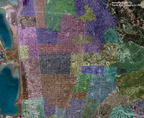| Date |
Speaker |
Location |
| Jan. 25 |
No Geolunch scheduled. |
111 Mulford conf. room |
Feb. 1 |
Bernt Wahl, UC Berkeley Industry Fellow. Center for Entrepreneurship & Technology.
 "Who is in my neighborhood? Defining neighborhood boundaries & identifying localized context" "Who is in my neighborhood? Defining neighborhood boundaries & identifying localized context"
Bernt
will talk about how he used multiple criteria to develop a new dataset
which identifies neighborhood boundaries for 11,000 neighborhoods for
the 150 largest cities in the U.S. Many data users might want to target
neighborhoods based on socioeconomic and other neighborhood
characteristics, rather than on zip code.
Image: Tiger level image of Berkeley neighborhoods |
111 Mulford conf. room |
Feb. 8 |
David P. Anderson, Space Sciences Laboratory,
U.C. Berkeley
"Citizen Cyber-Science"
The Internet lets the general public participate in scientific research
by donating computing resources and by
performing tasks that require human skills.
I'll describe some projects of this sort
and will discuss how to set up new ones.
|
111 Mulford conf. room |
Feb. 15
NEW TIME FOR THIS WEEK ONLY!
2:00-3:00 PM |
James Scarborough, Berkeley Environmental Technology
"BerkeleyImgseg - Creating a new image segmentation software product"
What does image segmentation algorithm research, environmental
consulting, and improving the environment have in common? Nothing.
This talk will describe how a group of Berkeley people decided to
create experimental software as a call to action. Berkeley
Environmental Technology's first product is image segmentation and
classification emphasizing large scale automation. But powerful
methods are no excuse for difficulty of use. As we eat pizza and
discuss the functionality of this application, the group's ideas and
consensus will become the next release. Download the current version
at imageseg.com.
Sponsored by ASPRS, Northern California Region Student Chapter (pizza provided!) |
111 Mulford conf. room |
| Feb. 22 |
TBA |
111 Mulford conf. room |
Feb. 29 |
John Rogan, Ph.D., Assistant Professor of Geography,
Graduate School of Geography,
Clark University
"Tropical Fire: Data and Dynamics from the Yucatan Peninsula, Mexico"
John
is a geographer specializing in lanscape ecology, fire ecology, optical
remote sensing and GISience. Recent research projects have involved
monitoring land cover change in California using remote sensing date,
mapping wildfire burn severity in southern California and southeastern
Arizona, and mapping forest types in Massachusetts using multi-season
Landsat data. |
111 Mulford conf. room |
| March 7 |
Edmund Seto, Environmental Health Sciences, School of Public Health, UC Berkeley
"An environmental scorecard for infectious disease surveillance in China" |
111 Mulford conf. room |
March 14 |
Peter Tittman, Geography Graduate Group, UC Davis
"Building a spatially explicit supply curve for biofuel production in the
Western United States using GIS and Network Analysis"
To analyze the potential supply of biofuels we constructed a hybrid
geographic information systems (GIS) and mixed integer linear program. The
model optimizes the location, type, and size of biorefineries based upon
feedstock, transportation, and conversion costs. |
111 Mulford conf. room |
| March 21 |
Justin Kitzes, Senior Manager, National Accounts Program, Global Footprint Network
"Sustainability Accounting with the Ecological Footprint"
|
111 Mulford conf. room |
| March 28 |
No Geolunch - Spring Break |
111 Mulford conf. room |
April 4 |
Fernando Sedano, Dept. of Environmental Science, Policy, and Management, UC Berkeley.
Fernando will give a slide show and talk about his volunteer work with GISCorps.
Sponsored by ASPRS, Northern California Region Student Chapter (pizza provided!) |
111 Mulford conf. room |
| April 11 |
Student presentations (prep. for AAG 2008 Annual Conference)
Sponsored by ASPRS, Northern California Region Student Chapter (pizza provided!) |
111 Mulford conf. room |
| April 18 |
No Geolunch - AAG 2008 Annual Conference |
111 Mulford conf. room |
| April 25 |
Student presentations (prep. for ASPRS 2008 Annual Conference)
Sponsored by ASPRS, Northern California Region Student Chapter (pizza provided!) |
111 Mulford conf. room |
| May 2 |
No Geolunch - ASPRS 2008 Annual Conference |
111 Mulford conf. room |
May 9 |
Ian Read, Department of History, UC Berkeley
"Merging Lived Space with Relational Space: Forging a Common Methodology in GIS and Networks"
GIS and social network theory share three important characteristics.
First, social scientists and historians use the two methodologies to
reveal patterns of human behavior and provide ways of explaining or
predicting change over time. Second, both stress the importance of
representational space, either the lived, physical space or an abstract,
social space. And finally, the two methodologies have profited enormously
from advances in computation. Despite parallel development and conceptual
overlap, the primary tools that we use for these methods are largely
disconnected. Ian will use examples from his own
historical research to explore the possibilities of a workable "Network
Analytic GIS." |
111 Mulford conf. room |